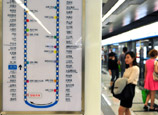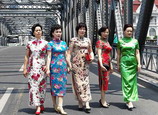
'I'm the one'
After the suicides, Zschaepe is believed to have set fire to a flat she shared with the men in Zwickau, in east Germany. Four days later, she turned herself in to police in her hometown of Jena, saying: "I'm the one you're looking for."
For the victims' families, the trial will be the first chance to come face-to-face with Zschaepe, whose blank expression and resolute silence since her arrest have left people struggling to make sense of her motives.
"The Banality of Evil" read the front page of the newspaper Die Welt. The mass-circulation Bild wrote that Zschaepe "looks like a woman at the supermarket register" rather than someone "rabidly mad or explosive".
Few expect Zschaepe to explain herself at the trial. The Norwegian anti-immigrant mass murderer Anders Behring Breivik, who killed 77 people in 2011, wrote to Zschaepe last year addressing her as "Dear Sister" and urging her to use the trial to spread far-right ideology.
Hearings are scheduled into early 2014, with Zschaepe's estranged relatives and the parents of Mundlos and Boehnhardt due to testify.
As teenagers in Jena, the trio were known to authorities to be involved in racist hate crimes and bomb making, but they escaped arrest and assumed new identities.
Prosecutors say they hose shopkeepers and small business owners as easy targets to try to hound immigrants out of Germany. Some of the victims' relatives came under suspicion because police simply did not consider a far-right motive.
"During the investigations they were either treated as suspects, or as relatives of criminals," said lawyer Angelika Lex.
Parliament is conducting an inquiry into how police and intelligence agencies failed to link the murders or share information about the far-right threat.
The trial was postponed for two weeks after an uproar over the court's failure to guarantee Turkish media a seat.

















 2 killed, 1 injured in man's street knife attacks in Beijing | Attacker named
2 killed, 1 injured in man's street knife attacks in Beijing | Attacker named


![]()
